On Thursday morning, the world woke up to the news of the death of iconic New Zealand cricketer Martin Crowe. He was 53.
A teenage prodigy who went on to carve an illustrious career with his superlative batting and smart captaincy, he lost his three-year long battle against cancer.
The former skipper of the Black Caps was initially diagnosed with follicular lymphoma in 2012, and the disease went into remission later.
In September 2014, Crowe said a new, more aggressive form of the disease, double-hit lymphoma, had developed and he was told only five percent survive more than 12 months.
He fought on for another 18 months before succumbing to the deadly disease.
Unfortunately, Crowe is among a few famous cricketers who battled to beat cancer but didn't survive the fight.
From Malcolm Marshall to Mike Denness, and David Shepherd to Richie Benaud, Rediff.com lists the cricketers who lost their big fight against cancer.
Sir Frank Worrell
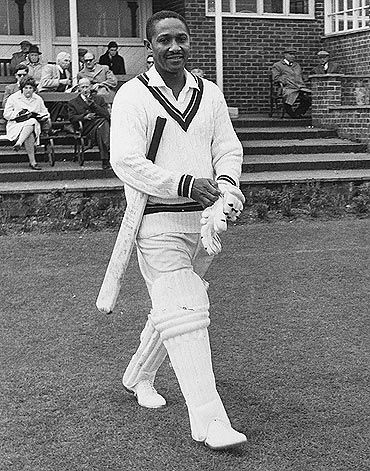
One of the first legends of the game, Sir Frank Worrell was just 42 when he was diagnosed with leukemia. It was detected during the West Indies' tour of India in 1966-67, on which Worrell was the visiting side's manager.
Worrell, who was part of the famous 'The Three Ws' - Everton Weekes and Clyde Walcott being the other members – died on March 13, 1967, a month after returning to Jamaica following the diagnosis.
The Frank Worrell Trophy, awarded to the winner of the Test series between Australia and West Indies, is named after him.
Sir Richie Benaud
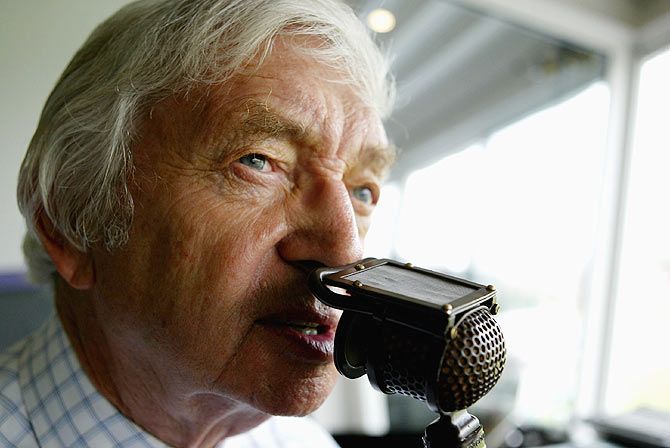
One of the greats of the game and an encyclopedia of cricketing anecdotes, Australia's Richie Benaud also lost his fight to cancer last April.
He was a household name in the cricket world for over 65 years. Fifteen years as an active player for Australia, and 50 as a commentator, after he called it a day, as the Voice of Cricket.
In November 2014, he revealed that he was fighting a skin cancer on his head and his public appearances became rare.
After 35 years calling Australian cricket for Channel Nine, Benaud was unable to take his spot behind the microphone in the summer of 2013-14 after crashing his vintage car near his home in Sydney's beachside suburb of Coogee.
A giant figure in the game both on and off the field, Benaud died in his sleep in a Sydney hospice at the age of 84.
Malcolm Marshall
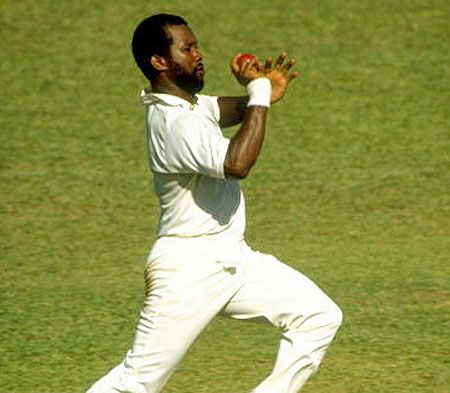
Former West Indian pacer Malcolm Marshall, who put fear into the hearts of opposition batsmen when he ran in to bowl, could not have the same effect on life.
Once the highest wicket-taker for the Windies, with 376 Test victims (until Courtney Walsh surpassed him), Marshall died of colon cancer on November 4, 1999, aged 41.
Just before his death, he was on leave from his coaching position after undergoing surgery in 1998.
In a career that lasted 15 years, he was regarded as one of the greatest fast bowlers of all-time, and formed the fearsome pace quartet in the 1980s alongside Joel Garner, Andy Roberts and Michael Holding.
He also took 157 wickets in One-dayers and was a handy lower order batsman.
Mike Denness
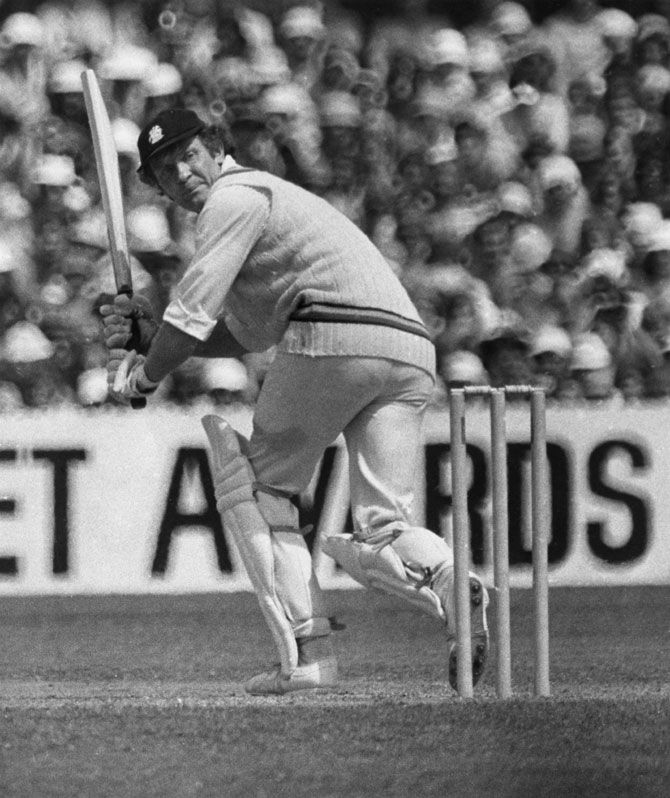
A Scotsman, who led England in 19 of his 28 Test matches, Mike Denness died of cancer on April 19, 2013.
Denness, who became match referee after his playing career, was infamous for his decision to sanction six Indian players, including Sachin Tendulkar, during a Test against South Africa in Port Elizabeth in 2001-02, sparking a row that led to both teams barring him from officiating in following match.
In his playing days, his friction with teammate Geoffrey Boycott saw the latter sit out the team for four years after his refusal to play under Denness's captaincy.
Controversy apart, Denness was a competent Test player who averaged almost 40.
Ken Wadsworth
Ken Wadsworth played 33 Tests and was a promising player for the Black Caps.
He was the first 'keeper to score a century in One-dayers, in the sixth ODI ever played, and was regarded highly for his consistency.
After his superlative show behind the stumps in the 1975 World Cup, he continued to excel.
A year later, he showed his prowess with the bat, smashing an unbeaten 46 off just 56 deliveries against India at Auckland, to help the Kiwis to an 80-run win.
That was to be his last international match.
The way he went about his cricket, he would have certainly broken more records, but the creator had other plans for him.
In mid-1976 it was revealed that he was battling melanoma (skin cancer) and he eventually lost his fight to the disease within a few months. He was just 29 when he passed away on August 19, 1976.
David Shepherd
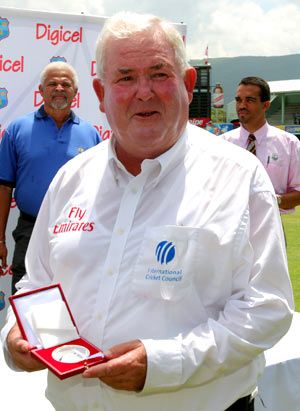
The 'hopper', English David Shepherd was known for his cheerful and warm personality on the field.
The former Gloucestershire batsman and England umpire officiated in 92 Tests and 172 One-day internationals, including three World Cup finals.
He was famous for his aversion to the 'Nelson' - scores with a multiple of 111 - at which he hopped on one leg at the crease between deliveries.
He played county cricket for Gloucestershire, from 1965-79, hitting 10,672 runs.
His final international match was the One-Day International between England and Australia at the Brit Oval on July 12, 2005.
Shepherd passed away on October 28,2009 after a long battle with cancer, at the age of 68.
Fred Trueman
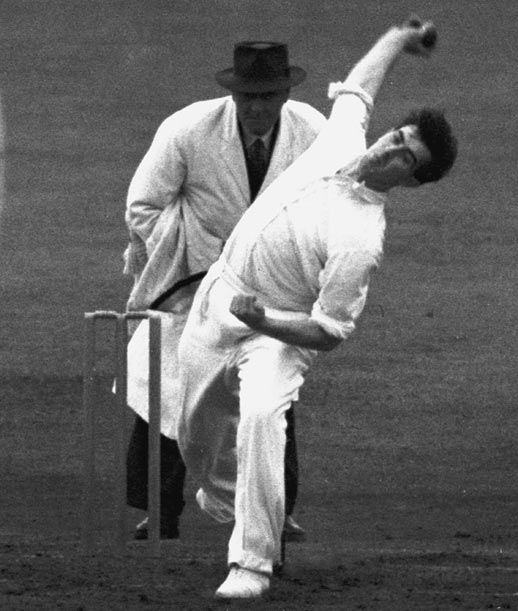
One of the finest fast bowlers of all time, England pacer Fred Trueman was also a victim of cancer.
In 1964, the man known as Fiery Fred became the first bowler to take 300 Test wickets.
Trueman finished with 307 wickets in 67 Tests, averaging 21.57. He took five wickets in an innings 17 times and 10 wickets in a match on three occasions.
In July 2006, Trueman died after a short battle with lung cancer. He was 75.
Budhi Kunderan
Budhi Kunderan played 18 Test matches, mostly under captain Mansur Ali Khan Pataudi.
He was known to be in the Mahendra Singh Dhoni mould, an attacking batsmen, unafraid to play his shots.
It doesn't come across as a surprise, therefore, that he was out hit-wicket in his first Test innings.
He slammed two hundreds, including a Test best of 192 - against England in Madras, and three 50s to have an impressive average of 32.70 as a wicketkeeper-batsman. He also took 23 catches and effected seven stumpings.
The Mangalore-born Kunderan played local cricket for Mumbai, later moving to Scotland where he breathed his last.
On July 23, 2006, at the age of 68, he succumbed to lung cancer.
Other well-known cricketers who fell victim to cancer were Roy Fredericks, Graham Dilley, Brian Luckhurst and Inshan Ali.
- ALSO READ












 © 2025
© 2025